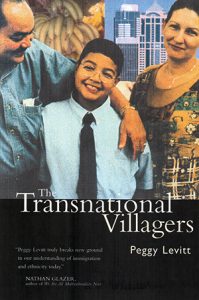The Transnational Villagers

Author: Peggy Levitt
Publisher: University of California Press
Year of Publication: 2001
Print Length: 294 pages
Genre: Non-Fiction / Sociology, Migration & Refugee Studies
Area: Dominican Republic, The Caribbean, The United States of America (USA)
Topic: Transnationalism, Local & Global, Globalization, Migrants, Foreign/Migrant Workers, Diaspora, Migration, Assimilation, Integration, Family, Community Development, Financial & Social Remittances, Social Network, Gender, Race, Religion, History, Politics & Power, Receiving Country, Sending Country
Contrary to popular opinion, increasing numbers of migrants continue to participate in the political, social, and economic lives of their countries of origin even as they put down roots in the United States. The Transnational Villagers offers a detailed, compelling account of how ordinary people keep their feet in two worlds and create communities that span borders. Peggy Levitt explores the powerful familial, religious, and political connections that arise between Miraflores, a town in the Dominican Republic, and Jamaica Plain, a neighborhood in Boston and examines the ways in which these ties transform life in both the home and host country.
The Transnational Villagers is one of only a few books based on in-depth fieldwork in the countries of origin and reception. It provides a moving, detailed account of how transnational migration transforms family and work life, challenges migrants’ ideas about race and gender, and alters life for those who stay behind as much, if not more, than for those who migrate. It calls into question conventional thinking about immigration by showing that assimilation and transnational lifestyles are not incompatible. In fact, in this era of increasing economic and political globalization, living transnationally may become the rule rather than the exception.
Table of Contents
Acknowledgments
Maps
Introduction
PART ONE
1. The Historical Context
2. Social Remittances: How Global Culture Is Created Locally
PART TWO
3. Reshaping the Stages of the Life Cycle
4. Making Values from Two Worlds Fit
PART THREE
5. When Domestic Politics Becomes Transnational
6. “God Is Everywhere”: Religious Life across Borders
7. Transnationalizing Community Development
Conclusion
Appendix A. Figures and Tables
Appendix B. Methodology
Notes
References
Index

Peggy Levitt is Chair and Professor of Sociology and the Luella LaMer Slaner Professor in Latin American Studies at Wellesley College and an Associate at Harvard University’s Weatherhead Center for International Affairs. She is also the co-founder of the Global (De)Centre. Her list of books, include, Artifacts and Allegiances: How Museums Put the Nation and the World on Display (University of California Press, 2015), Religion on the Edge (Oxford University Press, 2012), God Needs No Passport (New Press, 2007), The Transnational Studies Reader (Routledge, 2007), The Changing Face of Home (Russell Sage, 2002), and The Transnational Villagers (UC Press, 2001). Special journal volumes she co-edited that were later published as books include Books, Bodies, and Bronzes: Comparing Sites of Global Citizenship Creation (2015) and Links to the Diasporic Homeland: Second Generation “Ancestral Return.” (2014).
Source: https://www.peggylevitt.org/
More from Peggy Levitt in this library, click here.
